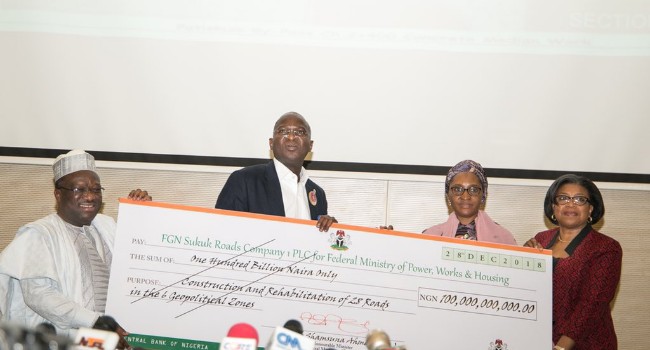Business
Fashola defends FG’s heavy borrowing, says it’s necessary

The Minister of Power, Works and Housing, Mr. Babatunde Raji Fashola, has defended Federal Government’s heavy borrowing, saying it has become necessary in order to invest in infrastructure after the country failed to invest in it when there were heavy revenues from the sale of crude oil.
Fashola stated this alongside the Minister of Finance, Mrs. Zainab Ahmed at the symbolic presentation of N100 billion proceed from the Sukuk bond issued by the Federal Government on December 28, 2018.
According to Fashola, the economy benefitted in diverse ways when the government made an investment in infrastructure.
According to Fashola, borrowing does not only enable the government to finance critical infrastructure but also to power other aspects of the economy.
He said: “For those who ask: why are we borrowing? We are borrowing to build assets that will last us over 30 years which if we wait will be more expensive to build.
“More importantly, where is the money going? As soon as I collect this cheque, I am going to give it to the contractors. But even the contractors can’t keep it. They have to give it to their suppliers because they need quarry materials; they need bitumen; they need iron rods; they need cement; they need tyres; they need diesel.
“When this money moves, it is going to the miners to produce building materials and construction materials. It is going to the steel company to produce steel. Who are the people that will also benefit from it? Again, the banks are going to benefit.
“As the money is being lodged and moved out, charges are being made. So, the whole economy benefits from this. In closing, the manufacturers of bitumen are waiting. The manufacturers of cement and steel are waiting. This is how building drives an economy.
“Of course, the most important for us are the people we ignore as a nation – builders, artisans, labourers. They are also waiting. We can’t wait to receive the money because this is dry weather.”
Also speaking at the event, the Finance Minister, explained that the N100bn Sukuk funds would be used to further support the government’s capital spending on road projects already captured in the 2018 budget.
Read also: 2019: World Bank predicts 2.2% GDP growth for Nigeria
According to Ahmed, 40.69 per cent of the fund came from Pension Fund Administrators, 17.5 per cent from Deposit Money Banks and 17.33 per cent from retail investors.
She said further revealed that 11.65 per cent came from fund managers and non-bank financial institutions, 10.94 per cent from non-interest banks while 1.89 per cent of the fund came from other investors.
The minister, who expressed gratitude to investors who had bought into the government’s programme by investing their resources in the Sukuk fund issued by the Federal Government, said: “There is for us a clear indication of the acceptance of this finance product. The significant increase in the level of participation by retail investors moved from about four per cent in the last issuance to 17 per cent in this current issue.
“This means that the Federal Government’s objective of financial inclusion is deepening. We now have a wider base of Federal Government securities and this is on the upward trend. Let me just say that we had specifically 1,876 retail investors that participated in this particular Sukuk issuance.”
Join the conversation
Support Ripples Nigeria, hold up solutions journalism
Balanced, fearless journalism driven by data comes at huge financial costs.
As a media platform, we hold leadership accountable and will not trade the right to press freedom and free speech for a piece of cake.
If you like what we do, and are ready to uphold solutions journalism, kindly donate to the Ripples Nigeria cause.
Your support would help to ensure that citizens and institutions continue to have free access to credible and reliable information for societal development.






















